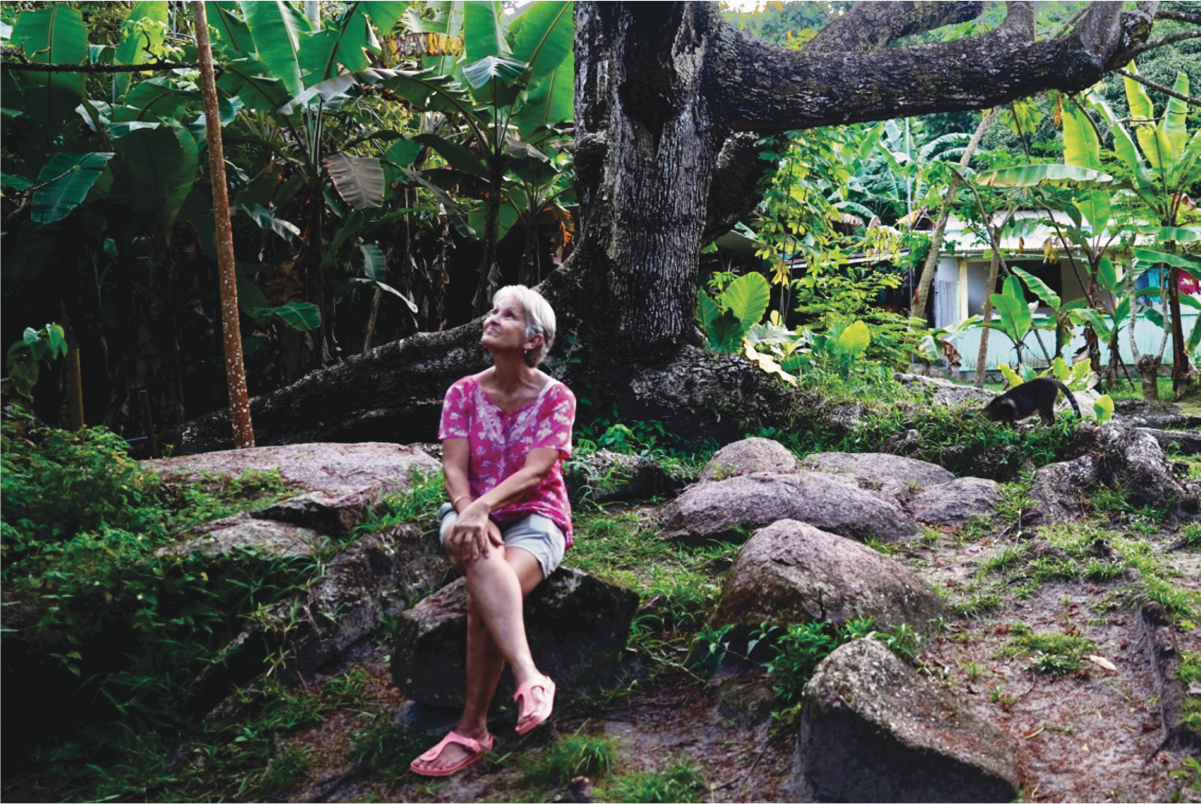Juliette's Agricultural Journey: Elevating a Family Legacy through Sustainability and Renewable Energy in Seychelles
Within the lush landscapes of Seychelles, known for its pristine beaches and azure waters, lies the lesser- known story of its farmers— those who fight to make a living off the fertile soils and sunlit farms of the islands. At the heart of this story is Juliette, a Seychellois farmer from Praslin island whose passion for sustainable agriculture is combining the essence of traditional crops and technology to reshape local farming in a region blessed with natural beauty but burdened by agricultural challenges.
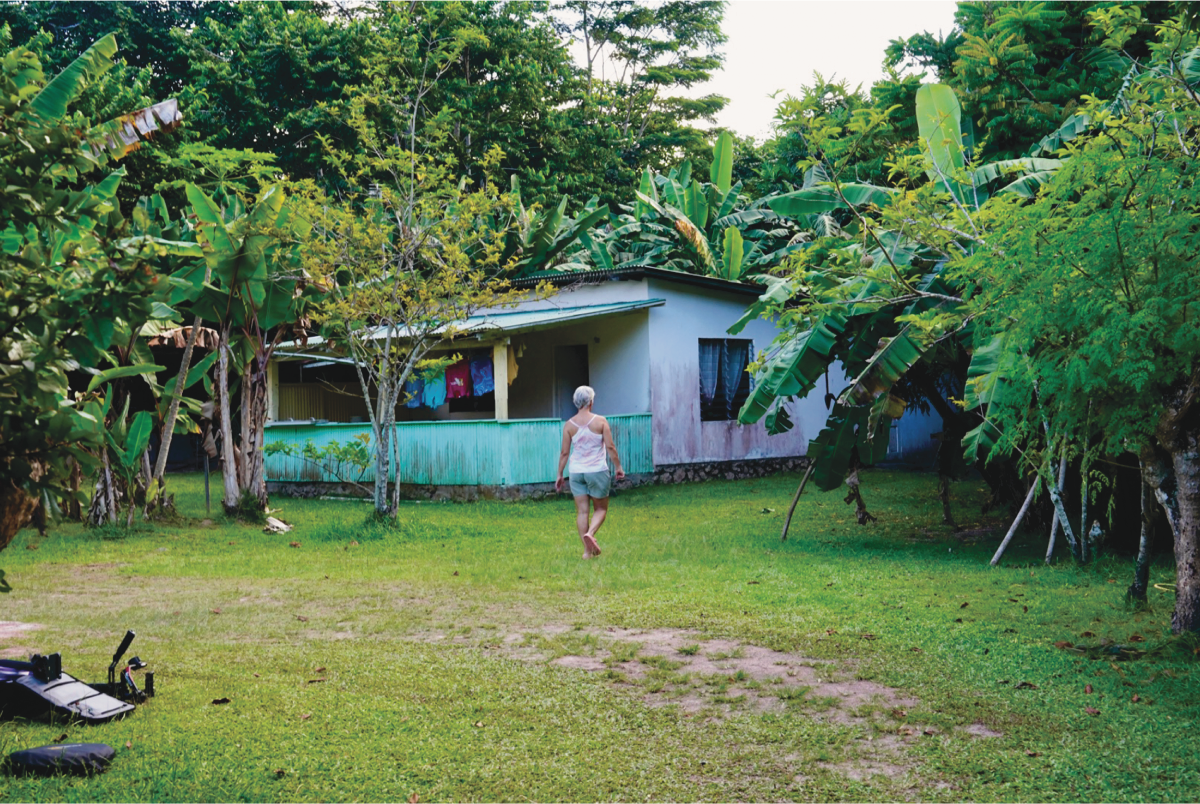
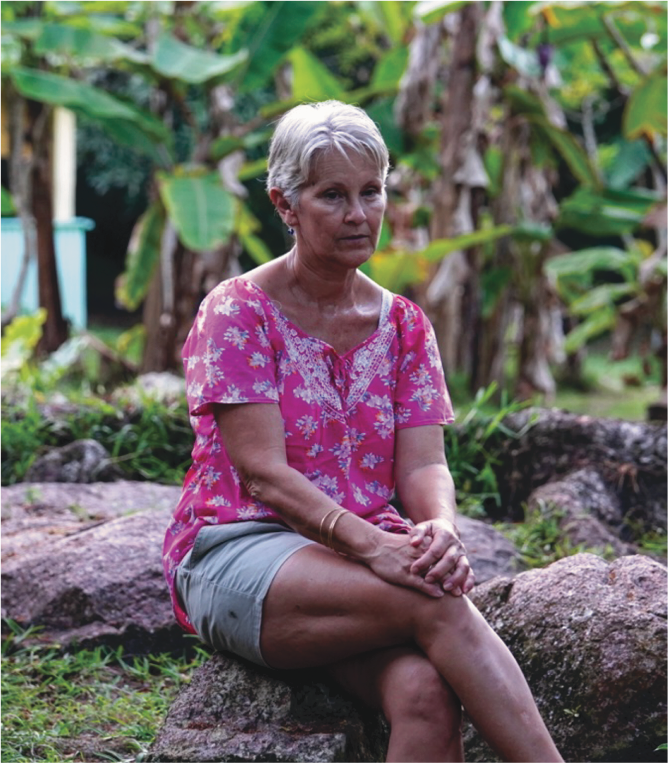
Juliette’s journey back to Seychelles was not a straightforward one. After spending 35 years in the United States, where she traveled to study arts, her curiosity and eagerness to understand human behavior led her to explore intellectual domains such as psychology and sociology. After years spent raising her children, an urgent family circumstance brought her back to the land she knew as a child. “My children had left for college and my dad wasn’t well, so I decided to return to my roots,” she shares decisively. Juliette boarded a plane carrying quite an ambitious goal in her luggage: to become a farmer like her grandfather, André Ferrari, who started the family farm in 1934. After her father, Henry Ferrari, took over the farm after her grandfather passed away, the farm was somewhat abandoned. In 2014, it was Juliette’s time to return and revitalized the residence and its fields, renaming it ‘’St. Joseph Farm’’. Preserving the land from unnecessary chemicals, building boundaries with other small local farmers, and integrating solar energy were some of the new seeds she would soon plant.
Farming through sustainable practices in Seychelles: a satisfactory but also demanding process
Seychelles, with its tropical climate and breathtaking landscapes, is a true paradise for biodiversity, showcasing rich ecosystems and vibrant flora and fauna. Juliette’s farm exemplifies this natural beauty as she cultivates a variety of crops, including lettuce, potatoes, and indigenous produce. Throughout the year, she grows an impressive selection of fruits and vegetables, such as bananas, cassava, coconuts, sweet potatoes, avocados, papayas, oranges, lemons, jackfruit, and more. “People like to know that we use minimal chemicals. We pull out the weeds by hand—it's costly, but there’s no Roundup on our farm,” she proudly states. Her commitment to organic farming has received a warm welcome among the inhabitants of Praslin, who appreciate the availability of locally grown produce throughout the seasons, allowing them to enjoy fresh, seasonal flavors year-round.
However, Juliette explains the challenges that come with this idyllic setting: “Farming here is expensive. You work hard to fight pests, especially with crops like tomatoes, only to see imported goods sold at half the price.” This competitive threat hits home for local farmers, who are constantly battling to maintain their livelihoods in the face of cheap, often chemically-treated, imported produce.
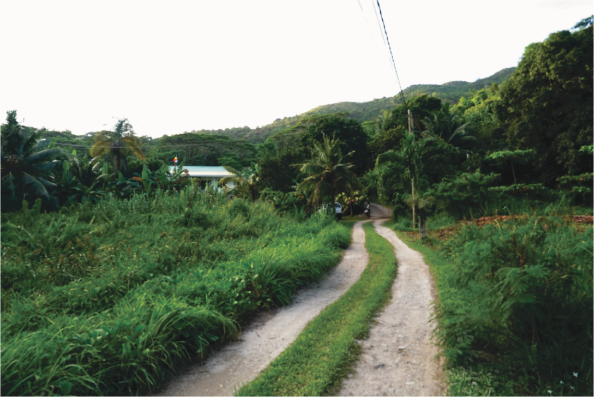
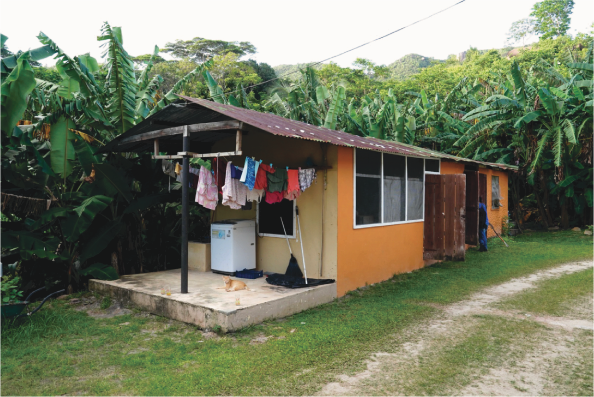
The Challenge of Tailoring Technologies for Seychellois Small Farmers
Juliette’s passion for agriculture goes beyond her own fields. She works hand in hand with the Seychelles Farmers Association, a group that strategizes the use of innovative technological solutions to render their work more efficient and affordable. “We’re working to attract funding and technology. Instead of throwing leaves and branches away, we can use them. We have a lot of small farms that need smaller machines.” Her vision is clear: to ensure that Seychelles’ smallscale farmers have access to the tools and resources they need to thrive in a competitive agricultural market.
Technology, she believes, holds the key. “Even for planting seeds, there are technologies out there that could help. I don’t need to go vertical because I have space, but for others with smaller lands, vertical farming would be ideal.” Juliette is not just focused on her own success; she firmly believes in sharing knowledge with her peers to see the farming community that surrounds her uplifted.
The Recent Impact of Climate Change in Seychelles
Living in harmony with nature has always been Juliette’s approach, but climate change has made this balance stagger through difficulties. “This year, the rain damaged our crops, and we were late. What should have grown in August is still struggling in October because it’s not raining enough,” she says, frustration mingled with acceptance. “You just have to say: well, it’s nature, you can’t control it, you just have to go with it.”
 Sun means growth, means strength, means hard work, means health… it provides us with our daily vitamins, but we also have
to be careful and use it responsibly” (Juliette)
Sun means growth, means strength, means hard work, means health… it provides us with our daily vitamins, but we also have
to be careful and use it responsibly” (Juliette)
These climatic shifts are just one of the many challenges Juliette faces. Competing with cheaper imports has taken its toll on local farmers, and she feels the impact deeply. “We have losses, and sometimes we have to sell below value.” But the race against climate change also unveils new options, such as solar-powered technologies that are expanding promisingly. Juliette is aware of a cold storage unit being installed in Praslin Island. “I’m a big believer in using solar panels. If every farmer had smaller chillers powered by solar energy, it would be a game-changer, especially for those who are making value-added products. A solar chiller is a good idea because sometimes we produce the same thing at the same time, and a chiller helps you store the produce longer.”
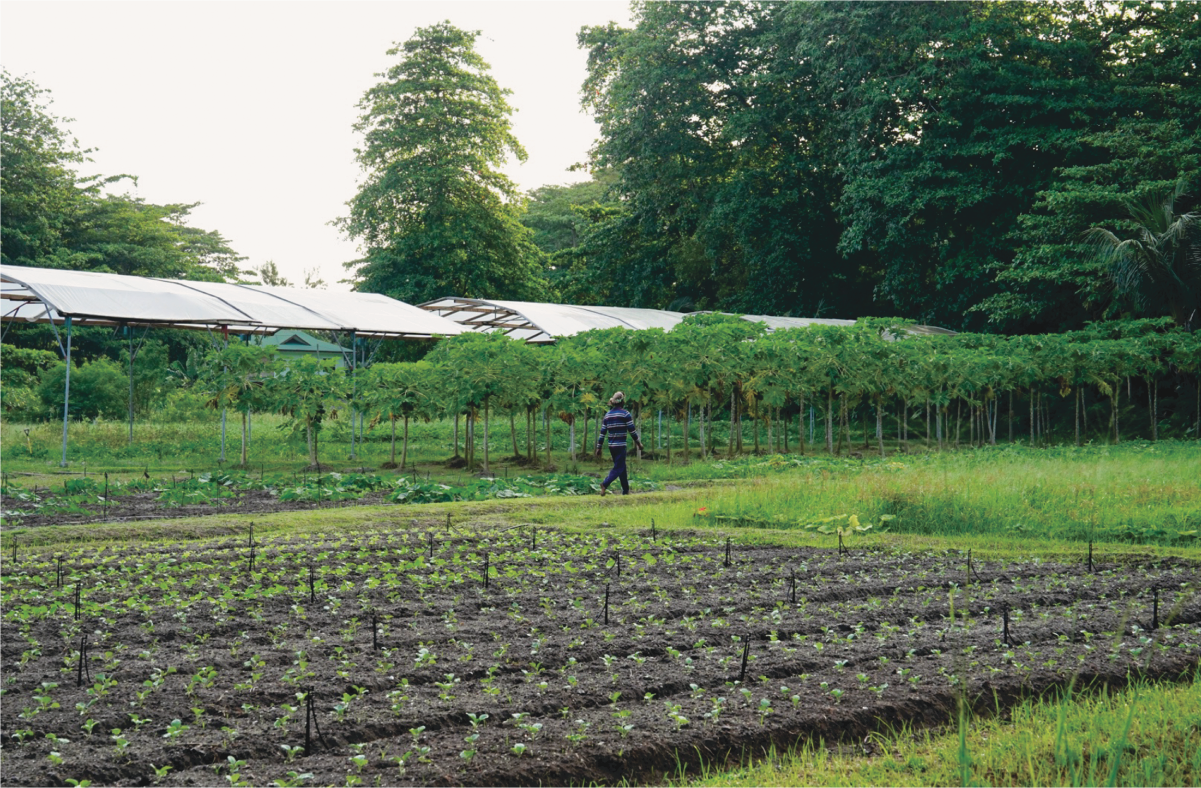
The International Solar Alliance (ISA), in collaboration with the Ministry of Energy of Seychelles, has been working on a DEMO project, an innovative initiative featuring a solar-powered cold storage unit designed for local farmers like Juliette. This initiative has an immense potential to impact the productions in Seychelles: allowing farmers to store their fruits and vegetables under optimal conditions means reducing food waste significantly. Also, being able to store crops for longer periods allows to plan the harvests more strategically, as farmers will not be pressured to sell their produce immediately after such harvest due to concerns about spoilage. Instead, farmers can monitor market trends and wait for favorable pricing, ultimately maximizing their earnings and contributing to more sustainable farming practices in Seychelles.
Two New Seeds for the Future Generations of Farmers: Respect and Cooperation
The conversation with Juliette takes a new direction: future. She dreams of a future where farmers in Seychelles are valued and appreciated for their contributions. “Here, people ask me, ‘Why do you farm? Why not go into tourism?’ In the United States, farmers are more respected. I would like people here to understand what we do for society.”
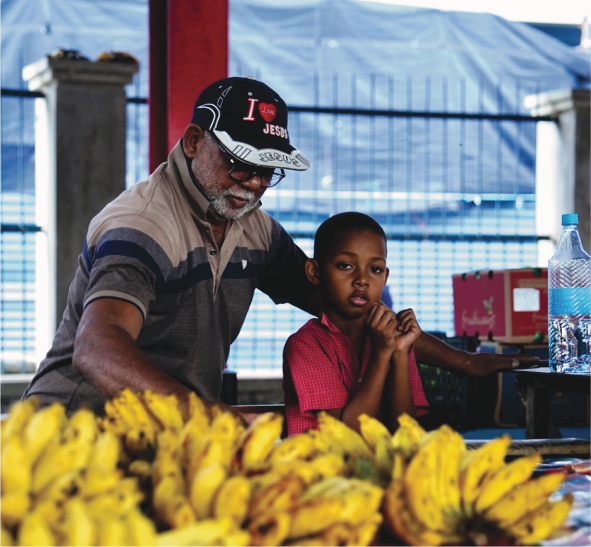
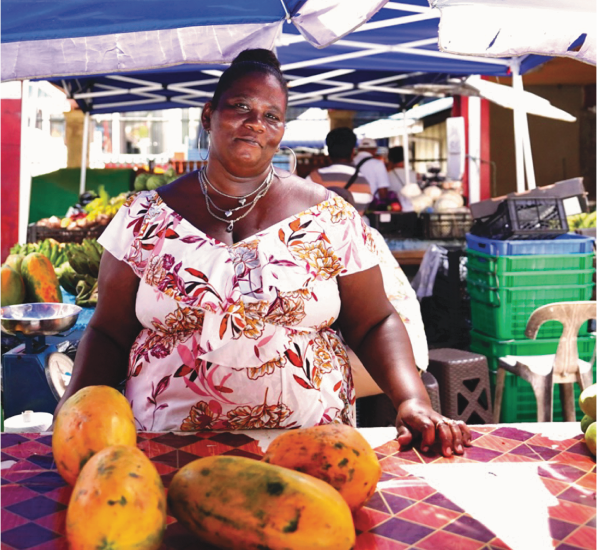
For the next generation of farmers, Juliette hopes for greater recognition and support, especially for small-scale farmers. “Some small farmers don’t have the means for transportation. Without local farmers, we would be importing kasava (an edible root typically grown locally in many tropical countries). They should have a special status to thrive.”
Her generosity during the COVID-19 pandemic is a reflection of her dedication to her community. When tourism halted and locals faced economic hardship, Juliette provided her produce at a fraction of the cost. “It was better than throwing it away!” she says, her voice filled with quiet pride. As Juliette looks to the future, her dreams are as much about the land as they are about the people who tend it. With her hands in the soil and her eyes on the sun, she is planting the seeds of change towards sustainability—not just for herself, but for the entire Seychelles farming community.
